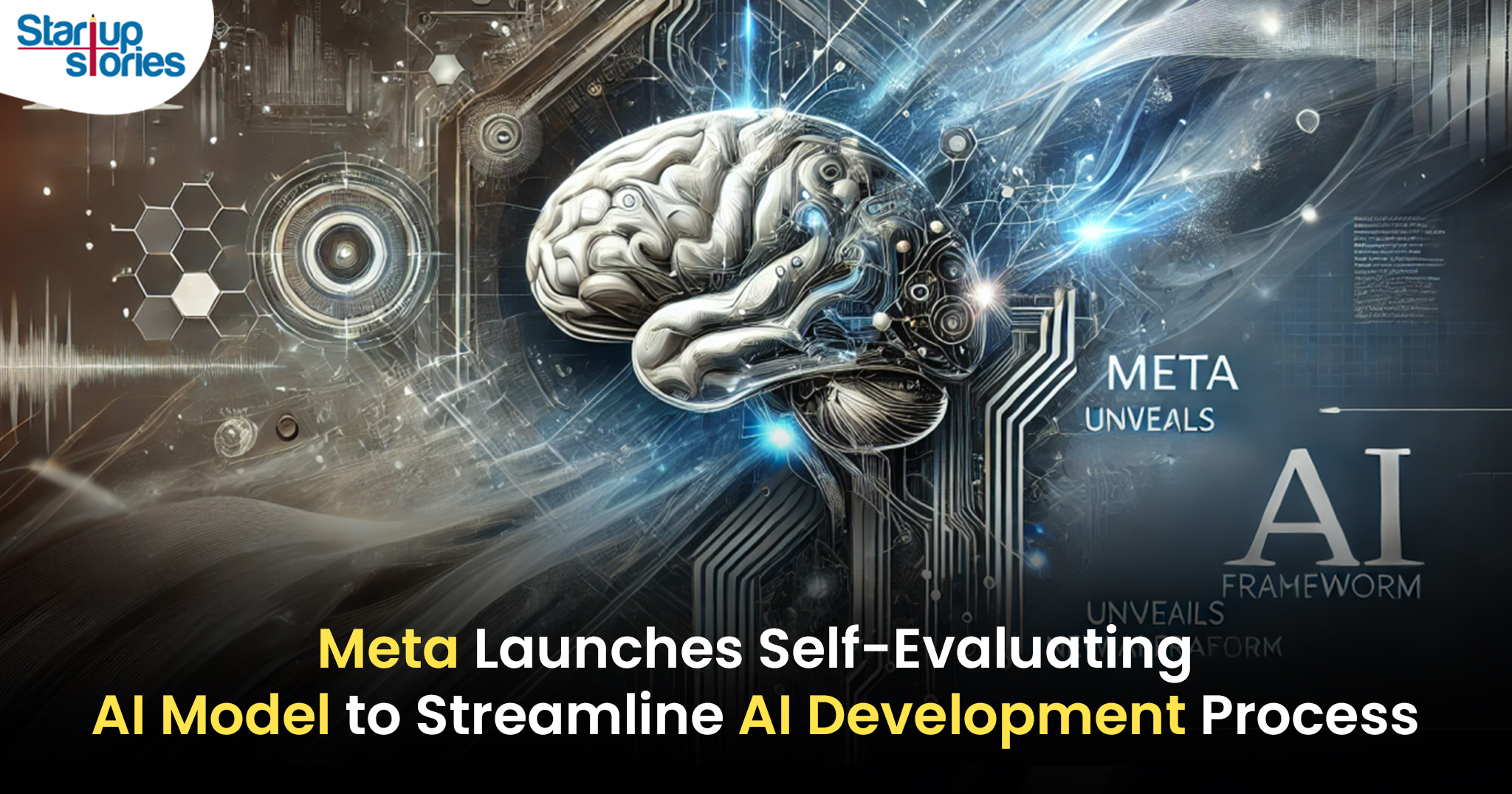Artificial Intelligence
Meta Unveils AI Model for Evaluating Other AI Models’ Performance!

Meta, the parent company of Facebook, announced on Friday the release of several new AI models from its research division, including an innovative “Self-Taught Evaluator” designed to reduce human involvement in the AI development process. This initiative represents a significant advancement in how AI models are assessed and improved.
Overview of the Self-Taught Evaluator
This announcement follows Meta’s introduction of the tool in an August research paper, which detailed its reliance on the “chain of thought” technique, similar to the recently launched models by OpenAI. This approach involves deconstructing complex problems into smaller, logical steps, enhancing the accuracy of responses in challenging areas such as science, coding, and mathematics.
Training Methodology
Meta’s researchers trained the evaluator model using entirely AI-generated data, effectively eliminating human input during this stage. This shift towards using AI to evaluate AI presents a promising avenue toward creating autonomous agents capable of learning from their mistakes.
“As AI becomes more super-human, we hope it will improve its ability to check its own work, becoming more reliable than the average human,” stated Jason Weston, one of the researchers behind the project.
Implications for AI Development
Many experts in the AI field envision these self-improving models as intelligent digital assistants capable of executing a wide range of tasks without requiring human intervention. This technology could potentially streamline the costly and often inefficient process known as Reinforcement Learning from Human Feedback (RLHF), which relies on human annotators with specialized knowledge to accurately label data and verify complex mathematical and writing queries.
Cost and Efficiency Benefits
By reducing reliance on human feedback, Meta aims to lower costs associated with training AI models while increasing efficiency. The traditional RLHF process can be resource-intensive and slow; thus, automating some aspects could lead to faster iterations and improvements in model performance.
Broader Context of Meta’s AI Strategy
In addition to the Self-Taught Evaluator, Meta released updates to other AI tools, including enhancements to its image-identification model, Segment Anything, a tool designed to accelerate response times for large language models, and datasets aimed at facilitating the discovery of new inorganic materials.
Competitive Landscape
While companies like Google and Anthropic have also explored concepts similar to Meta’s Self-Taught Evaluator—such as Reinforcement Learning from AI Feedback (RLAIF)—they typically do not make their models publicly available. This positions Meta uniquely in the competitive landscape by promoting transparency and accessibility in AI research.
Future Prospects
The introduction of self-evaluating models aligns with broader trends in artificial intelligence where autonomy and self-improvement are becoming increasingly important. As these technologies evolve, they could significantly impact various industries by enabling more sophisticated applications that require less human oversight.
Potential Applications
The implications for sectors such as healthcare, finance, and customer service are vast. For instance:
- Healthcare: Self-evaluating models could assist in diagnosing diseases by continuously learning from new data.
- Finance: In trading algorithms, these models could adapt to market changes more swiftly than traditional systems.
- Customer Service: Intelligent chatbots could improve their responses based on user interactions without needing constant human training.
Conclusion
Meta’s unveiling of the Self-Taught Evaluator marks a pivotal moment in AI development, emphasizing a future where machines can learn from themselves with minimal human intervention. As this technology matures, it holds the potential to revolutionize how AI systems are built and refined across various industries.
The ongoing commitment to innovation at Meta reflects a broader ambition within the tech industry to harness advanced AI capabilities while addressing challenges related to efficiency and cost-effectiveness. As self-improving models become more prevalent, they may redefine our understanding of artificial intelligence and its role in everyday life.
Artificial Intelligence
UAE G42 Launches 8-Exaflop AI Supercomputer in India for Sovereign AI 2026

UAE-based G42 has announced plans to deploy an 8 exaflop AI supercomputer in India, announced at the AI Impact Summit 2026 in Delhi. This national-scale project partners with Cerebras, MBZUAI, and India’s C-DAC, operating under full Indian data sovereignty as part of the India AI Mission.
The supercomputer boosts sovereign AI capabilities, enabling startups, researchers, academics, SMEs, and government access for tailored applications like public services and language tech. G42 India CEO Manu Jain highlighted its role in making India AI-native while prioritizing security.
This follows India-UAE tech pacts in late 2025, positioning India among global leaders in exaflop AI infrastructure amid rising demand for localized compute. Cerebras CSO Andy Hock noted it will accelerate large model training for India-specific needs.
Artificial Intelligence
Adopt AI Secures $6 Million to Power No-Code AI Agents for Business Automation

Adopt AI, a San Jose and Bengaluru-based agentic AI startup, has raised $6 million in seed funding led by Elevation Capital, with participation from Foster Ventures, Powerhouse Ventures, Darkmode Ventures, and angel investors. The funding will be used to expand the company’s engineering and product teams and to scale enterprise deployments of its automation platform.
Founded by Deepak Anchala, Rahul Bhattacharya, and Anirudh Badam, Adopt AI offers a platform that lets businesses automate workflows and execute complex actions using natural language commands, without needing to rebuild existing systems. Its core products include a no-code Agent Builder, which allows companies to quickly create and deploy AI-driven conversational interfaces, and Agentic Experience, which replaces traditional user interfaces with text-based commands.
The startup’s technology is aimed at SaaS and B2C companies in sectors like banking and healthcare, helping them rapidly integrate intelligent agent capabilities into their applications. Adopt AI’s team includes engineers from Microsoft and Google, with Chief AI Officer Anirudh Badam bringing over a decade of AI experience from Microsoft.
The company has also launched an Early Access Program to let businesses pilot its automation solution and collaborate on new use cases.
Artificial Intelligence
Social Media Platforms Push for AI Labeling to Counter Deepfake Risks

Social media platforms are intensifying efforts to combat the misuse of deepfake technology by advocating for mandatory AI labeling and clearer definitions of synthetic content. Deepfakes, created using advanced artificial intelligence, pose significant threats by enabling the spread of misinformation, particularly in areas like elections, politics, and personal privacy.
Meta’s New Approach
Meta has announced expanded policies to label AI-generated content across Facebook and Instagram. Starting May 2025, “Made with AI” labels will be applied to synthetic media, with additional warnings for high-risk content that could deceive the public. Meta also requires political advertisers to disclose the use of AI in ads related to elections or social issues, aiming to address concerns ahead of key elections in India, the U.S., and Europe.
Industry-Wide Efforts
Other platforms like TikTok and Google have introduced similar rules, requiring deepfake content to be labeled clearly. TikTok has banned deepfakes involving private figures and minors, while the EU has urged platforms to label AI-generated media under its Digital Services Act guidelines.
Challenges Ahead
Despite these measures, detecting all AI-generated content remains difficult due to technological limitations. Experts warn that labeling alone may not fully prevent misinformation campaigns, especially as generative AI tools become more accessible.
Election Implications
With major elections scheduled in 2025, experts fear deepfakes could exacerbate misinformation campaigns, influencing voter perceptions. Social media platforms are under pressure to refine their policies and technologies to ensure transparency while safeguarding free speech.













binance
March 2, 2025 at 9:28 am
Your point of view caught my eye and was very interesting. Thanks. I have a question for you.
g8sf9
June 7, 2025 at 5:35 pm
order cheap clomid can i order clomiphene pills clomiphene generic brand clomid chance of twins cheap clomid prices can i order cheap clomid prices can i buy generic clomid
www.binance.com注册
July 24, 2025 at 11:50 pm
Thanks for sharing. I read many of your blog posts, cool, your blog is very good.
iwin
November 6, 2025 at 7:08 am
iwin – nền tảng game bài đổi thưởng uy tín, nơi bạn có thể thử vận may và tận hưởng nhiều tựa game hấp
J88
November 7, 2025 at 11:58 am
Đến với J88, bạn sẽ được trải nghiệm dịch vụ cá cược chuyên nghiệp cùng hàng ngàn sự kiện khuyến mãi độc quyền.
MM88
November 8, 2025 at 2:37 am
Khám phá thế giới giải trí trực tuyến đỉnh cao tại MM88, nơi mang đến những trải nghiệm cá cược thể thao và casino sống động.
ios超级签
November 10, 2025 at 2:35 pm
苹果签名,苹果超级签平台,ios超级签平台ios超级签苹果企业签,苹果超级签,稳定超级签名
MM88
November 22, 2025 at 1:47 am
Với giao diện mượt mà và ưu đãi hấp dẫn, MM88 là lựa chọn lý tưởng cho các tín đồ giải trí trực tuyến.
GO88
November 23, 2025 at 1:36 am
Tham gia cộng đồng game thủ tại Go88 để trải nghiệm các trò chơi bài, poker phổ biến nhất hiện nay.
chanced casino
December 19, 2025 at 8:13 am
chanced casino chanced casino
dipfdvhg
February 4, 2026 at 1:17 am
https://asklong.ru
binance Register
February 17, 2026 at 6:30 pm
Your point of view caught my eye and was very interesting. Thanks. I have a question for you. https://accounts.binance.com/en/register-person?ref=JHQQKNKN